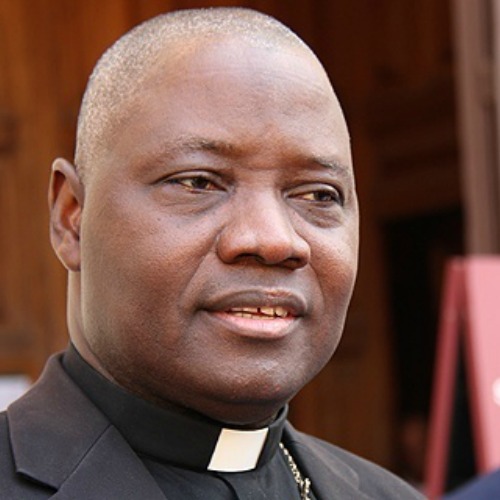Nigerian Archbishop Calls for Government Rescue of Schoolgirls
The archbishop of Jos said the government and military have to concretely act on promises to defeat the Boko Haram terrorists.

VATICAN CITY — Amid government reports that the nearly 200 girls kidnapped in Chibok could be home soon, Archbishop Ignatius Kaigama has called the country’s leaders to follow through with their promises.
“At the conclusion of the National Council of States Meeting … there was news that it will just be a matter of time before the girls are released,” Archbishop Ignatius Ayau Kaigama told CNA.
“That is good news, we hope. But we will have to see how far it goes, how concrete that news will be. As I said, there’s a lot of promises,” Archbishop Kaigama continued, adding, “Promises are not enough. We just want to see concrete action and the fruit of whatever the government is doing, along with the international community.”
The archbishop of Jos, Nigeria, and spokesman for the country’s Catholic bishops' conference, Archbishop Kaigama gave his comments following the conclusion of Nigeria’s July 8 National Council of States Meeting.
Convening for the second time this year, the meeting was attended by President Goodluck Johnson, the vice president, former heads of states, governors of the 36 states, including Abuja’s minister, former and present chief justices of the federation, the senate president, the speaker of the House of Representatives and the inspector general of police.
During their discussion, Nigeria’s Daily Post reported that Akwa Ibom’s state governor, Godswill Akpabio, said that at the top of “the agenda of the meeting was the security of the nation” and that the key security issue “was the rescue of [the] Chibok girls,” whom military services assured would be home soon.
Boko Haram’s Terror
The nearly 200 schoolgirls, mostly aged between 16 and 18, were kidnapped April 14 from their boarding school in Borno, Nigeria's northeastern-most state, by the militant Islamist group Boko Haram.
Launched in 2009 with the hope of imposing sharia, or Islamic law, on Nigera, Boko Haram has targeted security forces, politicians, Christian minorities and moderate Muslims in Nigeria’s predominantly Muslim north.
Its attacks have killed thousands since 2009, including at least 1,600 in 2014 alone. The U.N. estimates that the attacks have led to more than 470,000 internally displaced persons and some 57,000 refugees.
On June 23, an explosion attributed to Boko Haram at a public health college in Kano killed eight and wounded at least 20. In recent weeks, numerous villages in Nigeria's northeastern Borno have been attacked by the terrorist group, with dozens killed and more abductions of women and children.
Regarding the government’s promises of increased security and the Chibok girls’ release, Archbishop Kaigama explained that “the kidnapped girls have not been released, and we continue to experience a series of attacks in the Borno area, now even more than before.”
Although there is “a lot of work going on behind the scenes … we have yet to see the full effect of all that they have been doing.”
“What the ordinary man or woman wants is the truth of that work that the government claims they are doing; that there will be peace; that people can move freely; that people can go to churches and public places without the fear of being attacked by these terrorists. This is what every Nigerian wants.”
A Need for Action
Despite the positive outlook of Nigerian military forces regarding the situation, the archbishop emphasized that “we want to see the fruits” of their efforts.
“We don’t want to hear of promises or expectations that might not be met. We want to see concrete proof that they are doing everything in their power to guarantee freedom to Nigerians and to stop these terrorists communities that continue to kill many and destroy means of livelihood.”
The Church, he explained, does as much as possible “to be in solidarity with the suffering people”; however, it “has its limits” and “cannot go beyond a certain point.”
“We try to offer our hope; we try to keep things moving by participating in religious activities without locking up the churches, so that people feel like things are still going on.”
Noting that the Church doesn’t “have the power to do anything” more than this, the archbishop said that, “at this point, the only [hope] is the government,” and he encouraged both political and Church officials to continue fostering dialogue with Borno’s moderate Muslims in order to fight the Islamist terrorists.
Archbishop Kaigama revealed that there is evidence of some “people, organizations, religious leaders, leaders of different kinds,” who are accomplices of Boko Haram, even amongst security forces, and he urged the government to “use her intelligence sources in order to identify these people.”
Even beyond Nigeria there are “groups that are in partnership with Boko Haram, and they are groups that support them logistically, support them economically and even with weapons,” he continued.
“It is the duty of the government of Nigeria and the international community to find out who these groups are, who these people are and cut off their supply lines; and [we need to know] what they offer to the Nigerian terrorists so that they continue to kill.”
“We hope that these people can be identified and that they will be stopped,” the archbishop said, explaining that Nigerian people “are patient and continue to wait, hoping that the situation will be better.”
“I always like to say that Nigerians are a very patient people and very resilient also. They are also people of faith …and these are all the things that give them the hope to continue believing that things will be better; someday there will be light at the end of the tunnel.”













